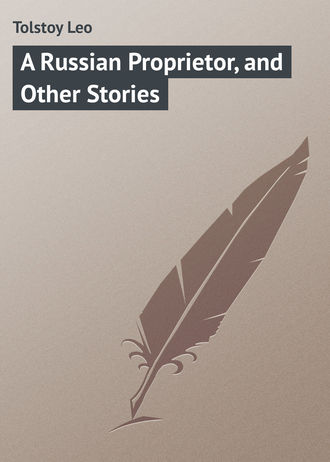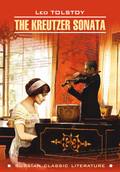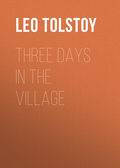
Лев Толстой
A Russian Proprietor, and Other Stories
IV
The young proprietor evidently desired to ask some more questions of the peasants. He did not move from the bench; and he glanced irresolutely, now at Churis, now at the empty, unlighted stove.
"Well, have you had dinner yet?" he asked at last.
A mocking smile arose to Churis's lips, as though it were ridiculous to him for his master to ask such foolish questions; he made no reply.
"What do you mean, – dinner, benefactor?" said the old woman, sighing deeply. "We've eaten a little bread; that's our dinner. We couldn't get any vegetables to-day so as to boil some soup,9 but we had a little kvas, – enough for the children."
"To-day was a fast-day for us, your excellency," remarked Churis sarcastically, taking up his wife's words. "Bread and onions; that's the way we peasants live. Howsomever, praise be to the Lord, I have a little grain yet, thanks to your kindness; it's lasted till now; but there's plenty of our peasants as ain't got any. Everywheres there's scarcity of onions. Only a day or two ago they sent to Mikháïl the gardener, to get a bunch for a farthing: couldn't get any anywheres. Haven't been to God's church scarcely since Easter. Haven't had nothing to buy a taper for Mikóla [St. Nicholas] with."
Nekhliudof, not by hearsay nor by trust in the words of others, but by the evidence of his own eyes, had long known the extreme depth of poverty into which his peasantry had sunken: but the entire reality was in such perfect contrast to his own bringing-up, the turn of his mind, and the course of his life, that in spite of himself he kept forgetting the truth of it; and every time when, as now, it was brought vividly, tangibly, before him, his heart was torn with painful, almost unendurable melancholy, as though some absolute and unavoidable punishment were torturing him.
"Why are you so poor?" he exclaimed, involuntarily expressing his thought.
"How could such as we help being poor, sir,10 your excellency? Our land is so bad, you yourself may be pleased to know, – clay and sand-heaps; and surely we must have angered God, for this long time, ever since the cholera, the corn won't grow. Our meadows and every thing else have been growing worse and worse. And some of us have to work for the farm, and some detailed for the manor-lands. And here I am with no one to help me, and I'm getting old. I'd be glad enough to work, but I hain't no strength. And my old woman's ailing; and every year there's a new girl born, and I have to feed 'em all. I get tired out all alone, and here's seven dependent on me. I must be a sinner in the eyes of the Lord God, I often think to myself. And when God takes me off sudden-like, I feel it would be easier for me; just as it's better for them than to lead such a dog's life here"…
"Oh, okh!" groaned the old woman, as a sort of confirmation of her husband's words.
"And this is all the help I have," continued Churis, pointing to the white-headed, unkempt little boy of seven, with a huge belly, who at this moment, timidly and quietly pushing the door open, came into the hut, and, resting his eyes in wonder and solemnity on the master, clung hold of Churis's shirt-band with both hands.
"This is all the assistance I have here," continued Churis in a sonorous voice, laying his shaggy hand on the little lad's white hair. "When will he be good for any thing? But my work isn't much good. When I reach old age I shall be good for nothing; the rupture is getting the better of me. In wet weather it makes me fairly scream. I am getting to be an old man, and yet I have to take care of my land.11 And here's Yermilof, Demkin, Zabref, all younger than I am, and they have been freed from their land long ago. Well, I haven't any one to help me with it; that's my misfortune. Have to feed so many; that's where my struggle lies, your excellency."
"I should be very glad to make it easier for you, truly. But how can I?" asked the young bárin in a tone of sympathy, looking at the serf.
"How make it easier? It's a well-known fact, if you have the land you must do enforced labor also;12 that's the regulation. I expect something from this youngster. If only you'd be good enough to let him off from going to school. But just a day or two ago, the officer13 came and said that your excellency wanted him to go to school. Do let him off; he has no capacity for learning, your excellency. He's too young yet; he won't understand any thing."
"No, brother, you're wrong there," said the bárin. "Your boy is old enough to understand; it's time for him to be learning. Just think of it! How he'll grow up, and learn about farming; yes, and he'll know his a-b-c's, and know how to read; and read in church. He'll be a great help to you if God lets him live," said Nekhliudof, trying to make himself as plain as possible, and at the same time blushing and stammering.
"Very true, your excellency. You don't want to do us an injury, but there's no one to take care of the house; for while I and the old woman are doing the enforced labor, the boy, though he's so young, is a great help, driving the cattle and watering the horses. Whatever he is, he's a true muzhík;" and Churis, with a smile, took the lad's nose between his fat fingers, and deftly removed the mucus.
"Nevertheless, you must send him to school, for now you are at home, and he has plenty of time, – do you hear? Don't you fail."
Churis sighed deeply, and made no reply.
V
"There's one other thing I wished to speak to you about," said Nekhliudof. "Why don't you haul out your manure?"
"What manure, sir,14 your excellency? There isn't any to haul out. What cattle have I got? One mare and colt; and last autumn I sold my heifer to the porter, – that's all the cattle I've got."
"I know you haven't much, but why did you sell your heifer?" asked the bárin in amazement.
"What have I got to feed her on?"
"Didn't you have some straw for feeding the cow? The others did."
"The others have their fields manured, but my land's all clay. I can't do any thing with it."
"Why don't you dress it, then, so it won't be clay? Then the land would give you grain, and you'd have something to feed to your stock."
"But I haven't any stock, so how am I going to get dressing?"
"That's an odd cercle vicieux," said Nekhliudof to himself; and he actually was at his wits' ends to find an answer for the peasant.
"And I tell you this, your excellency, it ain't the manure that makes the corn grow, but God," continued the peasant. "Now, one summer I had six sheaves on one little unmanured piece of land, and only a twelfth as much on that which was manured well. No one like God," he added with a sigh. "Yes, and my stock are always dying off. Five years past I haven't had any luck with 'em. Last summer one heifer died; had to sell another, hadn't any thing to feed her on; and last year my best cow perished. They were driving her home from pasture; nothing the matter, but suddenly she staggered and staggered. And so now it's all empty here. Just my bad luck!"
"Well, brother, since you say that you have no cattle to help you make fodder, and no fodder for your cattle, here's something towards a cow," said Nekhliudof, reddening, and fetching forth from his pocket a packet of crumpled bank-notes and untying it. "Buy you a cow at my expense, and get some fodder from the granary: I will give orders. See to it that you have a cow by next Sunday. I shall come to see."
Churis hesitated long; and when he did not offer to take the money, Nekhliudof laid it down on the end of the table, and a still deeper flush spread over his face.
"Many thanks for your kindness," said Churis, with his ordinary smile, which was somewhat sarcastic.
The old woman sighed heavily several times as she stood under the loft, and seemed to be repeating a prayer.
The situation was embarrassing for the young prince: he hastily got up from the bench, went out into the entry, and called to Churis to follow him. The sight of the man whom he had been befriending was so pleasant that he found it hard to tear himself away.
"I am glad to help you," said he, halting by the well. "It's in my power to help you, because I know that you are not lazy. You will work, and I will assist you; and, with God's aid, you will come out all right."
"There's no hope of coming out all right, your excellency," said Churis, suddenly assuming a serious and even stern expression of countenance, as though the young man's assurance that he would come out all right had awakened all his opposition. "In my father's time my brothers and I did not see any lack; but when he died, we broke all up. It kept going from bad to worse. Perfect wretchedness!"
"Why did you break up?"
"All on account of the women, your excellency. It was just after your grandfather died; when he was alive, we should not have ventured to do it: then the present order of things came in. He was just like you, he took an interest in every thing; and we should not have dared to separate. The late master did not like to look after the peasants; but after your grandfather's time, Andréï Ilyitch took charge. God forgive him! he was a drunken, careless man. We came to him once and again with complaints, – no living on account of the women, – begged him to let us separate. Well, he put it off, and put it off; but at last things came to such a pass, the women kept each to their own part; we began to live apart; and, of course, what could a single peasant do? Well, there wasn't no law or order. Andréï Ilyitch managed simply to suit himself. 'Take all you can get.' And whatever he could extort from a peasant, he took without asking. Then the poll-tax was raised, and they began to exact more provisions, and we had less and less land, and the grain stopped growing. Well, when the new allotment was made, then he took away from us our manured land, and added it to the master's, the villain, and ruined us entirely. He ought to have been hung. Your father15– the kingdom of heaven be his! – was a good bárin, but it was rarely enough that we ever had sight of him: he always lived in Moscow. Well, of course they used to drive the carts in pretty often. Sometimes it would be the season of bad roads,16 and no fodder; but no matter! The bárin couldn't get along without it. We did not dare to complain at this, but there wasn't system. But now your grace lets any of us peasants see your face, and so a change has come over us; and the overseer is a different kind of man. Now we know for sure that we have a bárin. And it is impossible to say how grateful your peasants are for your kindness. But before you came, there wasn't any real bárin: every one was bárin. Ilyitch was bárin, and his wife put on the airs of a lady,17 and the scribe from the police-station was bárin. Too many of em! ukh! the peasants had to put up with many trials."
Again Nekhliudof experienced a feeling akin to shame or remorse. He put on his hat, and went on his way.
VI
"Yukhvanka the clever18 wants to sell a horse," was what Nekhliudof next read in his note-book; and he proceeded along the street to Yukhvanka's place.19 Yukhvanka's hut was carefully thatched with straw from the threshing-floor of the estate; the frame-work was of new light-gray aspen-wood (also from stock belonging to the estate), had two handsome painted shutters for the window, and a porch with eaves and ingenious balustrades cut out of deal planks.
The narrow entry and the cold hut were also in perfect order; but the general impression of sufficiency and comfort given by this establishment was somewhat injured by a barn enclosed in the gates, which had a dilapidated hedge and a sagging pent roof, appearing from behind it.
Just as Nekhliudof approached the steps from one side, two peasant women came up on the other carrying a tub full of water. One was Yukhvanka's wife, the other his mother.
The first was a robust, healthy-looking woman, with an extraordinarily exuberant bosom, and wide fat cheeks. She wore a clean shirt embroidered on the sleeves and collar, an apron of the same material, a new linen skirt, peasant's shoes, a string of beads, and an elegant four-cornered head-dress of embroidered red paper and spangles.
The end of the water-yoke was not in the least unsteady, but was firmly settled on her wide and solid shoulder. Her easy forcefulness, manifested in her rosy face, in the curvature of her back, and the measured swing of her arms and legs, made it evident that she had splendid health and rugged strength.
Yukhvanka's mother, balancing the other end of the yoke, was, on the contrary, one of those elderly women who seem to have reached the final limit of old age and decrepitude. Her bony frame, clad in a black dilapidated shirt and a faded linen skirt, was bent so that the water-yoke rested rather on her back than on her shoulder. Her two hands, whose distorted fingers seemed to clutch the yoke, were of a strange dark chestnut color, and were convulsively cramped. Her drooping head, wrapped up in some sort of a clout, bore the most monstrous evidences of indigence and extreme old age.
From under her narrow brow, perfectly covered with deep wrinkles, two red eyes, unprotected by lashes, gazed with leaden expression to the ground. One yellow tooth protruded from her sunken upper lip, and, constantly moving, sometimes came in contact with her sharp chin. The wrinkles on the lower part of her face and neck hung down like little bags, quivering at every motion.
She breathed heavily and hoarsely; but her bare, distorted legs, though it seemed as if they would have barely strength to drag along over the ground, moved with measured steps.
VII
Almost stumbling against the prince, the young wife precipitately set down the tub, showed a little embarrassment, dropped a courtesy, and then with shining eyes glanced up at him, and, endeavoring to hide a slight smile behind the sleeve of her embroidered shirt, ran up the steps, clattering in her wooden shoes.
"Mother,20 you take the water-yoke to aunt Nastásia," said she, pausing at the door, and addressing the old woman.
The modest young proprietor looked sternly but scrutinizingly at the rosy woman, frowned, and turned to the old dame, who, seizing the yoke with her crooked fingers, submissively lifted it to her shoulder, and was about to direct her steps to the adjacent hut.
"Your son at home?" asked the prince.
The old woman, her bent form bent more than usual, made an obeisance, and tried to say something in reply, but, suddenly putting her hand to her mouth, was taken with such a fit of coughing, that Nekhliudof without waiting went into the hut.
Yukhvanka, who had been sitting on the bench in the "red corner,"21 when he saw the prince, threw himself upon the oven, as though he were anxious to hide from him, hastily thrust something away in the loft, and, with mouth and eyes twitching, squeezed himself close to the wall, as though to make way for the prince.
Yukhvanka was a light-complexioned fellow, thirty years of age, spare, with a young, pointed beard. He was well proportioned, and rather handsome, save for the unpleasant expression of his hazel eyes, under his knitted brow, and for the lack of two front teeth, which immediately attracted one's attention because his lips were short and constantly parted.
He wore a Sunday shirt with bright red gussets, striped print drawers, and heavy boots with wrinkled legs.
The interior of Vanka's hut was not as narrow and gloomy as that of Churis's, though it was fully as stifling, as redolent of smoke and sheep-skin, and showing as disorderly an array of peasant garments and utensils.
Two things here strangely attracted the attention, – a small damaged samovár standing on the shelf, and a black frame near the ikon, with the remains of a dirty mirror and the portrait of some general in a red uniform.
Nekhliudof looked with distaste on the samovár, the general's portrait, and the loft, where stuck out, from under some rags, the end of a copper-mounted pipe. Then he turned to the peasant.
"How do you do, Yepifán?" said he, looking into his eyes.
Yepifán bowed low, and mumbled, "Good-morning, 'slency,"22 with a peculiar abbreviation of the last word, while his eyes wandered restlessly from the prince to the ceiling, and from the ceiling to the floor, and not pausing on any thing. Then he hastily ran to the loft, dragged out a coat, and began to put it on.
"Why are you putting on your coat?" asked Nekhliudof, sitting down on the bench, and evidently endeavoring to look at Yepifán as sternly as possible.
"How can I appear before you without it, 'slency? You see we can understand"…
"I have come to ask you why you need to sell a horse? Have you many horses? What horse do you wish to sell?" said the prince without wasting words, but propounding questions that he had evidently pre-considered.
"We are greatly beholden to you, 'slency, that you do not think it beneath you to visit me, a mere peasant," replied Yukhvanka, casting hasty glances at the general's portrait, at the stove, at the prince's boots, and every thing else except Nekhliudof's face. "We always pray God for your 'slency."
"Why sell the horse?" repeated Nekhliudof, raising his voice, and coughing.
Yukhvanka sighed, tossed back his hair (again his glance roved about the hut), and noticing the cat that lay on the bench contentedly purring, he shouted out to her, "Scat, you rubbish!" and quickly addressed himself to the bárin. "A horse, 'slency, which ain't worth any thing. If the beast was good for any thing, I shouldn't think of selling him, 'slency."
"How many horses have you in all?"
"Three horses, 'slency."
"No colts?"
"Of course, 'slency. There is one colt."
VIII
"Come, show me your horses. Are they in the yard?"23
"Indeed they are, 'slency. I have done as I was told, 'slency. Could we fail to heed you, 'slency? Yakof Ilyitch told me not to send the horses out to pasture. 'The prince,' says he, 'is coming to look at them,' and so we didn't send them. For, of course, we shouldn't dare to disobey you, 'slency."
While Nekhliudof was on his way to the door, Yukhvanka snatched down his pipe from the loft, and flung it into the stove. His lips were still drawn in with the same expression of constraint as when the prince was looking at him.
A wretched little gray mare, with thin tail, all stuck up with burrs, was sniffing at the filthy straw under the pent roof. A long-legged colt two months old, of some nondescript color, with bluish hoofs and nose, followed close behind her.
In the middle of the yard stood a pot-bellied brown gelding with closed eyes and thoughtfully pendent head. It was apparently an excellent little horse for a peasant.
"So these are all your horses?"
"No, indeed, 'slency. Here's still another mare, and here's the little colt," replied Yukhvanka, pointing to the horses, which the prince could not help seeing.
"I see. Which one do you propose to sell?"
"This here one, 'slency," he replied, waving his jacket in the direction of the somnolent gelding, and constantly winking and sucking in his lips.
The gelding opened his eyes, and lazily switched his tail.
"He does not seem to be old, and he's fairly plump," said Nekhliudof. "Bring him up, and show me his teeth. I can tell if he's old."
"You can't tell by one indication, 'slency. The beast isn't worth a farthing. He's peculiar. You have to judge both by tooth and limb, 'slency," replied Yukhvanka, smiling very gayly, and letting his eyes rove in all directions.
"What nonsense! Bring him here, I tell you."
Yukhvanka stood still smiling, and made a deprecatory gesture; and it was only when Nekhliudof cried angrily, "Well, what are you up to?" that he moved toward the shed, seized the halter, and began to pull at the horse, scaring him, and getting farther and farther away as the horse resisted.
The young prince was evidently vexed to see this, and perhaps, also, he wished to show his own shrewdness.
"Give me the halter," he cried.
"Excuse me. It's impossible for you, 'slency, – don't"…
But Nekhliudof went straight up to the horse's head, and, suddenly seizing him by the ears, threw him to the ground with such force, that the gelding, who, as it seems, was a very peaceful peasant steed, began to kick and strangle in his endeavors to get away.
When Nekhliudof perceived that it was perfectly useless to exert his strength so, and looked at Yukhvanka, who was still smiling, the thought most maddening at his time of life occurred to him, – that Yukhvanka was laughing at him, and regarding him as a mere child.
He reddened, let go of the horse's ears, and, without making use of the halter, opened the creature's mouth, and looked at his teeth: they were sound, the crowns full, so far as the young man had time to make his observations. No doubt the horse was in his prime.
Meantime Yukhvanka came to the shed, and, seeing that the harrow was lying out of its place, seized it, and stood it up against the wattled hedge.
"Come here," shouted the prince, with an expression of childish annoyance in his face, and almost with tears of vexation and wrath in his voice. "What! call this horse old?"
"Excuse me, 'slency, very old, twenty years old at least. A horse that"…
"Silence! You are a liar and a good-for-nothing. No decent peasant will lie, there's no need for him to," said Nekhliudof, choking with the angry tears that filled his throat.
He stopped speaking, lest he should be detected in weeping before the peasant. Yukhvanka also said nothing, and had the appearance of a man who was almost on the verge of tears, blew his nose, and slowly shook his head.
"Well, how are you going to plough when you have disposed of this horse?" continued Nekhliudof, calming himself with an effort, so as to speak in his ordinary voice. "You are sent out into the field on purpose to drive the horses for ploughing, and you wish to dispose of your last horse? And I should like to know why you need to lie about it."
In proportion as the prince calmed down, Yukhvanka also calmed down. He straightened himself up, and, while he sucked in his lips constantly, he let his eyes rove about from one object to another.
"Lie to you, 'slency? We are no worse off than others in going to work."
"But what will you go on?"
"Don't worry. We will do your work, 'slency," he replied, starting up the gelding, and driving him away. "Even if we didn't need money, I should want to get rid of him."
"Why do you need money?"
"Haven't no grain, 'slency; and besides, we peasants have to pay our debts, 'slency."
"How is it you have no grain? Others who have families have corn enough; but you have no family, and you are in want. Where is it all gone?"
"Ate it up, 'slency, and now we haven't a bit. I will buy a horse in the autumn, 'slency."
"Don't for a moment think of selling your horse."
"But if we don't then what'll become of us, 'slency? No grain, and forbidden to sell any thing," he replied, turning his head to one side, sucking in his lips, and suddenly glancing boldly into the prince's face. "Of course we shall die of starvation."
"Look here, brother," cried Nekhliudof, paling, and experiencing a feeling of righteous indignation against the peasant. "I can't endure such peasants as you are. It will go hard with you."
"Just as you will, 'slency," he replied, shutting his eyes with an expression of feigned submission: "I should not think of disobeying you. But it comes not from any fault of mine. Of course, I may not please you, 'slency; at all events, I can do as you wish; only I don't see why I deserve to be punished."
"This is why: because your yard is exposed, your manure is not ploughed in, your hedges are broken down, and yet you sit at home smoking your pipe, and don't work; because you don't give a crust of bread to your mother, who gave you your whole place,24 and you let your wife beat her, and she has to come to me with her complaints."
"Excuse me, 'slency, I don't know what you mean by smoking your pipe," replied Yukhvanka in a constrained tone, showing beyond peradventure that the complaint about his smoking touched him to the quick. "It is possible to say any thing about a man."
"Now you're lying again! I myself saw"…
"How could I venture to lie to you, 'slency?"
Nekhliudof made no answer, but bit his lip, and began to walk back and forth in the yard. Yukhvanka, standing in one place, and not lifting his eyes, followed the prince's legs.
"See here, Yepifán," said Nekhliudof in a childishly gentle voice, coming to a pause before the peasant, and endeavoring to hide his vexation, "it is impossible to live so, and you are working your own destruction. Just think. If you want to be a good peasant, then turn over a new leaf, cease your evil courses, stop lying, don't get drunk any more, honor your mother. You see, I know all about you. Take hold of your work; don't steal from the crown woods, for the sake of going to the tavern. Think how well off you might be. If you really need any thing, then come to me; tell me honestly, what you need and why you need it; and don't tell lies, but tell the whole truth, and then I won't refuse you any thing that I can possibly grant."
"Excuse me, 'slency, I think I understand you, 'slency," replied Yukhvanka smiling as though he comprehended the entire significance of the prince's words.
That smile and answer completely disenchanted Nekhliudof so far as he had any hope of reforming the man and of turning him into the path of virtue by means of moral suasion. It seemed to him hard that it should be wasted energy when he had the power to warn the peasant, and that all that he had said was exactly what he should not have said.
He shook his head gravely, and went into the house. The old woman was sitting on the threshold and groaning heavily, as it seemed to the young proprietor as a sign of approbation of his words which she had overheard.
"Here's something for you to get bread with," said Nekhliudof in her ear, pressing a bank-note into her hand. "But keep it for yourself, and don't give it to Yepifán, else he'll drink it up."
The old woman with her distorted hand laid hold of the door-post, and tried to get up. She began to pour out her thanks to the prince; her head began to wag, but Nekhliudof was already on the other side of the street when she got to her feet.







